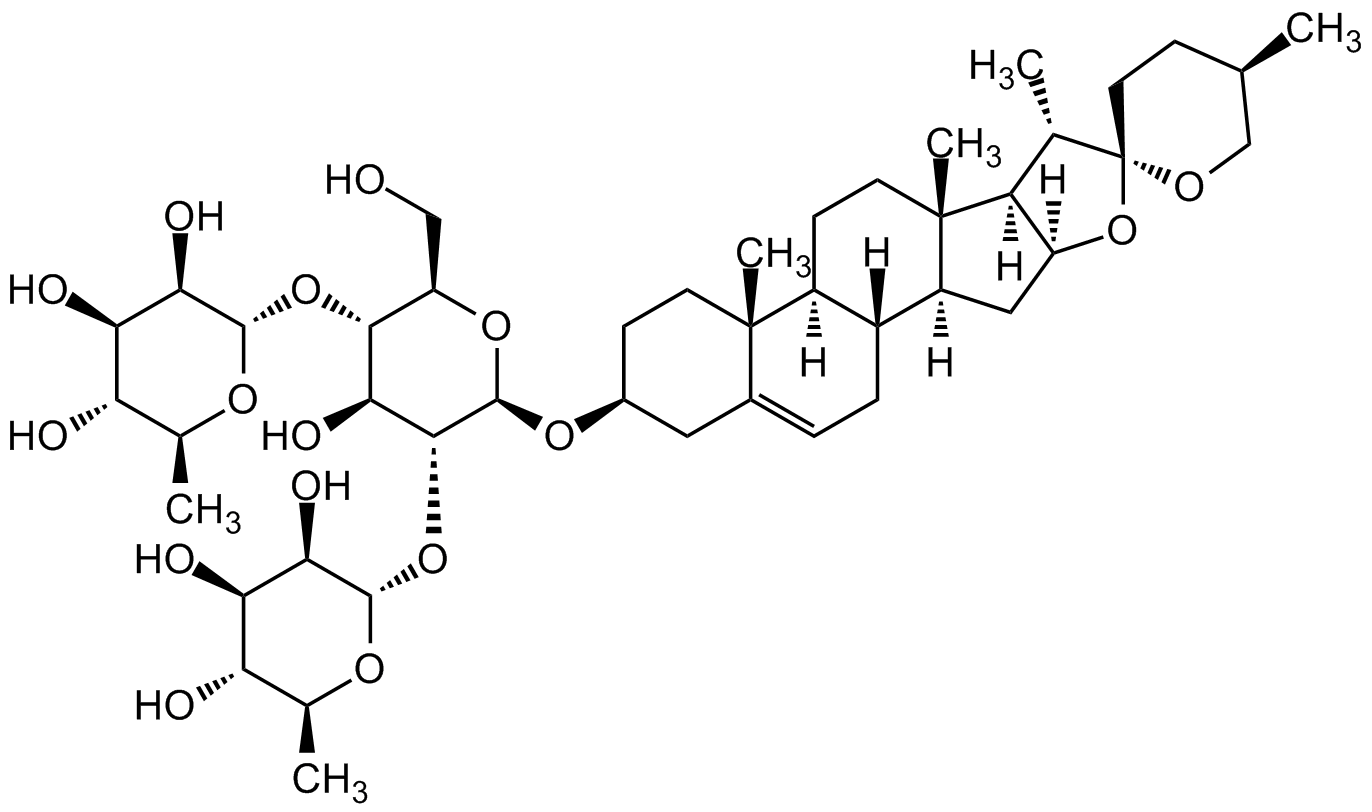
Chemical Structure
Dioscin [19057-60-4] [19057-60-4]
CDX-D0195
CAS Number19057-60-4
Product group Chemicals
Estimated Purity>98%
Molecular Weight869.04
Overview
- SupplierChemodex
- Product NameDioscin [19057-60-4] [19057-60-4]
- Delivery Days Customer2
- CAS Number19057-60-4
- CertificationResearch Use Only
- Estimated Purity>98%
- Molecular FormulaC45H72O16
- Molecular Weight869.04
- Scientific DescriptionChemical. CAS: 19057-60-4. Formula: C45H72O16. MW: 869.04. Dioscin is a natural steroid saponin originally isolated from plants used in herbal remedies. It has anticancer, anti-inflammatory, immunoregulatory, antioxidant, hyoplipidemic, antiviral, neuroprotective and antifungal activities. It inhibits proliferation, induces autophagy and oxygen-mediated apoptosis in cancer cells. It has been shown to inhibit colon tumor growth and tumor angiogenesis through regulating VEGFR2 and AKT/MAPK pathways. It inhibits adipogenesis through the AMPK/MAPK pathway. Dioscin showed protective effect against liver fibrosis by potently inhibiting ITGA5. Promotes proliferation of pancreatic beta cells via Wnt/beta-catenin signaling pathways. It has been shown inhibit the nuclear transport of NF-kappa and the expression of reactive oxygen species (ROS) and consequently the expression of inflammasome targets such as NLRP3. Potent inhibitor of Skp2, component of the ubiquitin/proteasome degradation pathway. - Dioscin is a natural steroid saponin originally isolated from plants used in herbal remedies. It has anticancer, anti-inflammatory, immunoregulatory, antioxidant, hyoplipidemic, antiviral, neuroprotective and antifungal activities. It inhibits proliferation, induces autophagy and oxygen-mediated apoptosis in cancer cells. It has been shown to inhibit colon tumor growth and tumor angiogenesis through regulating VEGFR2 and AKT/MAPK pathways. It inhibits adipogenesis through the AMPK/MAPK pathway. Dioscin showed protective effect against liver fibrosis by potently inhibiting ITGA5. Promotes proliferation of pancreatic beta cells via Wnt/beta-catenin signaling pathways. It has been shown inhibit the nuclear transport of NF-kappa and the expression of reactive oxygen species (ROS) and consequently the expression of inflammasome targets such as NLRP3. Potent inhibitor of Skp2, component of the ubiquitin/proteasome degradation pathway.
- SMILESC[C@H](CC1)CO[C@]21O[C@@]3([H])C[C@@]4([H])[C@]5([H])CC=C6C[C@@H](O[C@H](O[C@@H]7CO)[C@H](O[C@H]8[C@H](O)[C@H](O)[C@@H](O)[C@H](C)O8)[C@@H](O)[C@@H]7O[C@@H]9O[C@@H](C)[C@H](O)[C@@H](O)[C@H]9O)CC[C@]6(C)[C@@]5([H])CC[C@]4(C)[C@@]3([H])[C@@H]2C
- Storage Instruction2°C to 8°C
- UNSPSC12352200


![Dioscin [19057-60-4] [19057-60-4]](https://www.targetmol.com/group3/M00/36/96/CgoaEWayQQiETfVBAAAAAPJ8Eag704.png)